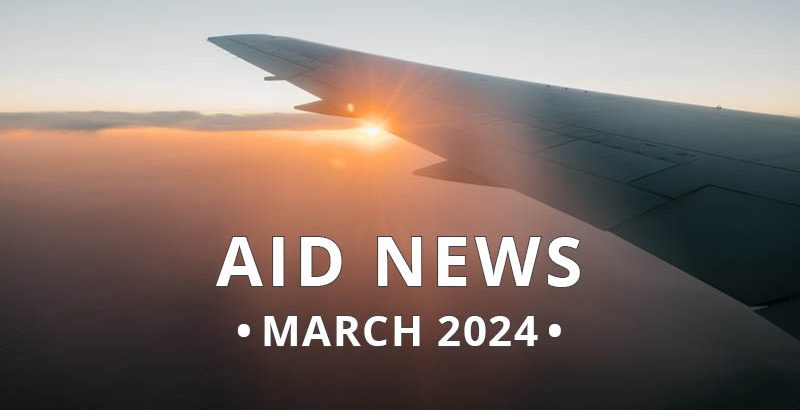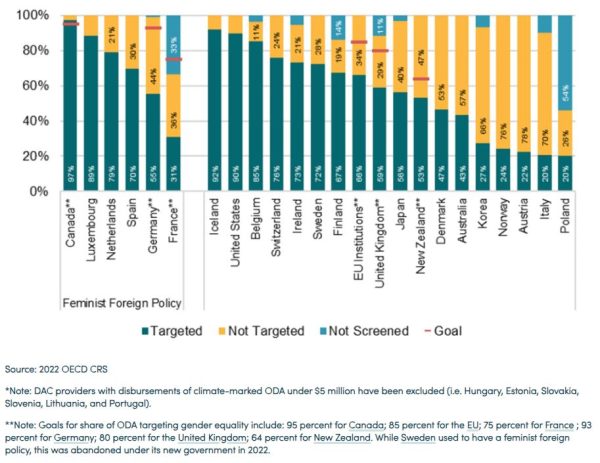Our monthly update of news and analysis on aid and international development, with a focus on Australian aid.
Australian aid
The Albanese government has joined several other Western donors and announced that it will lift its temporary suspension of $6 million in funding to the UN Relief and Works Agency for Palestine Refugees in the Near East (UNRWA) following “the adoption of strengthened internal controls to ensure its neutrality”. The US will reportedly maintain its ban on UNRWA funding until at least March 2025.
Foreign Minister Penny Wong also announced that Australia will provide logistical support to aid airdrops and allocate a further $6 million to other agencies working in Gaza, bringing Australia’s total humanitarian commitment since October 2023 to $52.5 million. Food security experts have warned that Gaza could be facing the most intense famine since the end of World War II. The UN High Commissioner for Human Rights, Volker Turk, has said that Israel’s restrictions on humanitarian aid “may amount to the use of starvation as a method of war, which is a war crime”.
Labor and the Coalition voted against a Greens motion in the Senate calling on the Australian government to halt all sales of military equipment to Israel in response to the humanitarian crisis.
At the Australia-ASEAN Special Summit in Melbourne, the government announced a new $222.5 million phase of its Mekong Australia Partnership and an additional $140 million for DFAT’s Partnerships for Infrastructure program. Around $17 million was announced to support ASEAN countries’ climate change and clean energy transitions and a new $2 billion Southeast Asia Investment Financing Facility, to be managed by Export Finance Australia on a commercial basis, will be established.
As part of a wider regional health program, Australia will allocate $17 million over five years to help improve the efficacy of and patients’ access to TB treatments in Indonesia, Philippines, Vietnam, and PNG.
The new government in Tuvalu has confirmed to Australia that it wants to move ahead with the Falepili Union agreement, allowing the treaty to proceed to ratification.
Australia has signed a new MOU with Korea (currently available only in Korean) on development cooperation, with a focus on policy dialogue and improving cooperation on gender, humanitarian and climate aid.
DFAT has published a new gender equality good practice note covering the definition and counting of gender equality aid against OECD rules, as well as program design and M&E standards.
ACFID’s 2024-25 pre-budget submission argues that the government should fund substantial increases to humanitarian, climate change and civil society programs in order to align government policy with the Labor party’s platform on aid and meet its wider foreign policy goals, including its ambition to host the UN climate summit in 2026 and gain a Security Council seat in 2029-30.
Australia will reportedly provide “initial grant financing” to the Fiji government and the Fiji Ports Corporation to upgrade ports and support shipbuilding, months after Fiji indicated it was looking to partner with China on the project.
Global/regional aid
Fiji will only be required to pay off the principal of a $102 million loan from India’s EXIM bank following agreement from the Indian government to write off all interest arrears from an ill-fated sugar mill repair project overseen by the previous Bainimarama government and the Fiji Sugar Corporation.
Fiji’s Home Affairs Minister Pio Tikoduadua has said that the country will maintain its 2011 law enforcement cooperation MOU with China following a review, but that it will assess the agreement again next year and will not continue to host Chinese officers within its police force.
After several months of legislative uncertainty, President Joe Biden has authorised the new compact agreements with the Federated States of Micronesia, Marshall Islands and Palau under which the US will provide around US$7.1 billion in funding to the three Pacific countries over the next 20 years.
The fate of US military and civilian aid to Ukraine and various measures to “out-compete” China on development remains uncertain in the face of congressional paralysis. Some congressional Republicans have taken up Donald Trump’s suggestion that all future aid to Ukraine should be delivered in the form of a no-interest, waivable loan.
The UNDP reveals that in 2023 developing regions had not met their anticipated Human Development Index (HDI) levels, based on pre-2019 trends, and “may have shifted to a lower HDI trajectory, indicating potential permanent setbacks in future human development progress”.
World Food Programme head Cindy McCain has said that the world has “forgotten” the crisis in Sudan and that the stability of the entire region is at stake with 25 million people across Sudan, South Sudan and Chad “trapped in a spiral” of food insecurity.
Zambia’s President Hakainde Hichilema has urged China and other creditors to end the stand-off over the country’s US$13 billion debt restructuring, labelling it “an indictment” of the credibility of the global system.
An OECD mid-term review of the UK’s aid performance has highlighted the negative impact of successive budget cuts and funding uncertainty, as well as “limited progress” on “developing common results, monitoring and evaluation approaches across government” and “ensuring the link between aid allocations and poverty reduction”. The review recommends that “FCDO [Foreign, Commonwealth and Development Office] should continue reflecting on how to ensure oversight and risk management support adaptive, innovative programming, particularly where embassies are reporting to geographic desks without a strong development focus.” The UK’s National Audit Office has published similar findings in an assessment of the 2020 integration of the former Department for International Development into the FCDO.
The World Health Summit Regional Meeting 2024, scheduled for 22-24 April in Melbourne, has now released its full program and registrations are open. Subsidies are available for attendees from eligible upper-middle-income, lower-middle-income and low-income countries.
Books, articles, reports, blogs, podcasts etc.
Writing for Australian Outlook, Liam Moore argues that Australia’s “partial and piecemeal” approach to climate change in the Pacific reflects a “deep inertia in [its] foreign policy and strategic culture”.
The Development Intelligence Lab podcast discusses its latest Pulse Check survey, looking at the perceptions and priorities of Australia’s aid to Indonesia.
Analysts at the Center for Global Development ask whether providers of climate finance are also effectively tackling gender equality. The chart below compares the extent to which individual donor spending categorised as climate aid also targets gender equality outcomes, using the OECD Development Assistance Committee’s sector markers.
2022 Climate-marked ODA Gross Disbursements by Gender Marker across DAC Members* **
Disclosure
Material for this update has been collected by Devpol staff; editorial responsibility lies with Cameron Hill. Devpol’s work on Australian aid is supported by the Bill & Melinda Gates Foundation. The views represent those of Centre staff only.




Leave a Comment